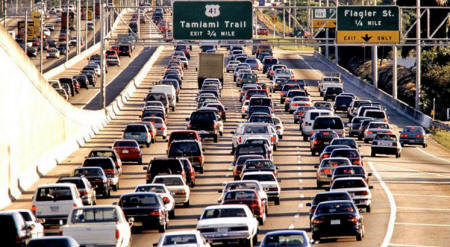The Free World Charter
from
TheFreeWorldChater Website
Let's make everything free
What is The Free World Charter?
Let's make everything free
The Free World Charter is a statement of principles that has the
potential to optimize life on Earth for all species, eradicate
poverty and greed, and advance progress.
Neither political nor religious, these ten short principles
could form the foundation of a new, advanced society that uses
no money, is free, fair and sustainable.
They are based solely on nature,
common sense and survival.
The Free World Charter is now widely considered a logical
progression out of the failing mechanisms of today's society,
and a natural step in our evolution.
Why we need it
In case you haven't noticed, the world has become a very hostile
place.
Basic living has become really
difficult for many of us, and is quite literally impossible for
millions of people every year. It does not have to be this way.
As the predominant species, we humans have failed to acknowledge
the great responsibility that comes with our great knowledge and
power. Money has seriously distorted our world view, and
distracted us from what is genuinely important.
Everything we need for survival:
water, food, air, energy,
biodiversity, compassion, have become jeopardized through
our prioritization of profit over nature.
Nature does not yield or negotiate.
If we continually fight against it,
nature will win. In other words, humanity - and countless other
innocent species - could face extinction. The time has come to
make some fundamental changes to our way of life, which has
become both unsustainable and unjust.
Adopting the principles of The
Free World Charter is, we believe, the first crucial step
mankind must now take in order to protect and preserve both
ourselves and our planet.
What is wrong with the world?
In a word: money...
Our own
monetary system of exchange now
effectively prioritizes financial stability and growth over
survival and progress. While once a useful tool in earlier
times, money has now become incompatible with life itself and
creates far more problems than it solves.
We can put these problems into four
main categories:
-
Inequality and Injustice
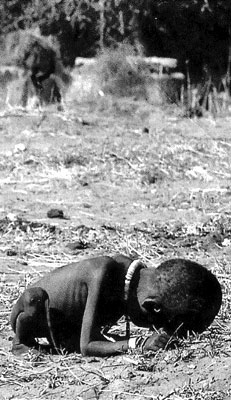
[Money, by definition,
creates
inequality and injustice.]
In today's world, a handful of people have enormous
wealth, influence and freedom, while the vast majority
are burdened with debt, labour and poverty; with little
or no say in world affairs.
This imbalance is clearly
unfair and can no longer just be accepted as normal.
Millions of people every year are born into a life of
poverty and starvation, even though we have the
resources and technology to feed and shelter everybody
if we want to.
Wasteful manufacturing drives an insatiable appetite for
limited natural resources like oil, copper, gold etc.
Since these scarce resources are only found in certain
countries, exploitation or cross-border conflicts
inevitably result.
Some areas of the world suffer extreme weather
conditions and a lack of arable soil or drinkable water,
yet are largely forgotten by richer nations as they have
nothing of value to contribute to the world economy.
Money, by definition, creates inequality and injustice.
-
Waste and Pollution
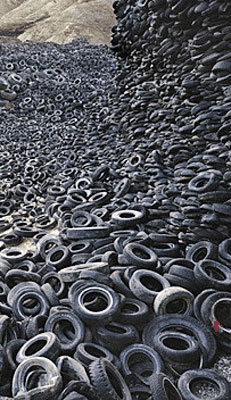
[Our disregard for nature
is slowly
poisoning and choking us.]
Manufacturing companies need a constant turnover of
products in order to be profitable.
It doesn't make financial
sense to make products that truly last. It is better for
cash-flow to keep producing disposable goods that
ultimately need replacing - despite the waste of natural
resources and pollution that this causes.
Many companies spend millions every year creating a
market for unnecessary and wasteful products through
clever advertising. This creates a culture of
consumerism and an illusion of 'limitless' growth which
is unrealistic, unsustainable and simply must end some
day.
We know that oil is a toxic pollutant that produces
carbon-dioxide, yet we still use it because it is cheap;
despite having abundant, clean renewable energy all
around us.
Oxygen-producing trees are plundered irresponsibly for
their wood, while airplanes pump millions of tons of
poisonous gases into our air every year.
Our disregard for nature is slowly poisoning and choking
us.
-
Debt and Unemployment
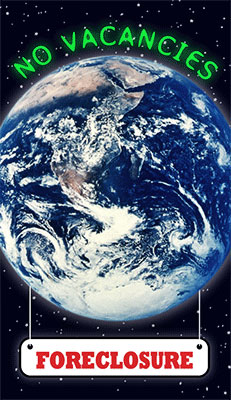
[Paid employment is the oxygen of the monetary system.
Without
it, all you get is more debt.
This
unemployment and debt cycle
will
ultimately bring about a global monetary collapse.]
Today, almost every country in the world has such huge
debts that governments are now forced to either borrow
more, spend less, or print more to meet their budgets.
Realistically, none of these
options are sustainable.
Printing money devalues the currency, meaning you can
buy less with it. Also, since it enters the economy as a
debt, it is subject to interest.
Since the money to pay this
interest doesn't even exist, it ultimately requires
another debt - and more interest!
Public spending cuts ultimately means job cuts, creating
further unemployment. Private companies continually
replace staff with machines that can work faster and
cheaper, to increase their productivity and profits.
Paid employment is the oxygen of the monetary system.
Without it, all you get is more debt. This unemployment
and debt cycle will ultimately bring about a global
monetary collapse.
-
Obstructed Progress
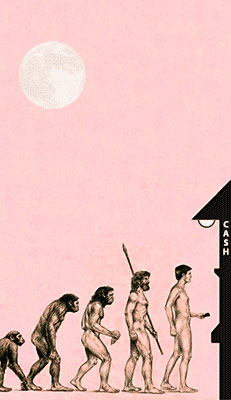
[Money is
no obstacle to progress
in a
money-free world.]
Human progress is stifled by cost. Pure research or bold
scientific endeavor are either under-funded or
overlooked unless they are profitable.
Highly skilled or talented professionals are attracted
by generous salaries to develop profitable but wasteful
consumer products. Conversely, many talented people are
held back in life through lack of access to proper
education or funding for their work.
New inventions get mired in patent laws that hinder
further development or improvement by other innovators,
and sometimes take years to reach the public. Many
useful patents lie dormant either through lack of
funding or deliberate marketing strategy.
Companies try to protect their own brands and future
profits by intentionally designing products that are
incompatible with other brands or technologies. This
creates an unnecessary duplicity of products and
frustrates the end user.
Money is no obstacle to progress in a money-free world.
These are just some of the reasons
why money - that we created - has now become a major obstacle to
our own survival and progress.
If you look at our society and
modern culture from a viewpoint of nature, you will quickly
begin to see just how detached and disconnected we have become
from the very stuff that sustains us.
We cannot ignore our own nature and biology.
Whose fault is it?
It's important to recognize that no-one is actually to blame for
any of these problems.
The system we use to run our society
has just grown that way over time. Attributing blame, even where
seemingly justified, has no useful purpose and just creates
adversity.
Many blame banks, corporations, governments, or the people who
work in them, but these are not bad or greedy people. They are
just ordinary people reacting to an environment of scarcity -
the scarcity of money, that is.
Greed is a basic human response to scarcity. If there is a
limited supply of something that you need to live, you
instinctively want as much as possible of it, because it's good
for survival.
If we can eliminate scarcity, we can
eliminate greed.
Under pressure
"We need to free ourselves from
our imaginary limits."
We have come to mistrust our own
natural behavior due to the conflicting standards and pressures
that we subject ourselves to.
Modern media promote unattainable and hedonistic lifestyles,
while religions teach moderation and chastity. Corporations
spends millions glamorizing sugary and fatty foods, while
medical officers warn of obesity. Governments announce public
spending cuts, while they bail out big businesses. Everywhere we
turn we are bombarded with advertising to buy products that we
can't afford.
Society, as a whole, is pretty
confusing and contradictory.
Crime rates are on the increase - but not because more people
are bad - because people's circumstances are getting worse,
employment opportunities are dwindling and everyone has to
compete to survive.
Remember, a human being is still an animal - albeit a highly
advanced one - and just like any other animal may strike out
when maltreated, cornered or confused.
We don't need to do this to ourselves any more.
It is time for us to disentangle the human being from his web of
outdated methods and ideologies, and focus on our common purpose
of survival, progress and freedom.
We need to free ourselves from our imaginary limits.
What the Charter does
The Free World Charter sets out ten very basic assertions that
are resonant with nature, general common sense, fairness and
sustainability
In essence, these ten guiding
principles are our minimum requirements for survival and
progress.
"Once people realize that a
money-free society works,
we will naturally become more
positive in our actions,
more cooperative, compassionate
and productive."
Our current systems of monetary,
social, ideological and border divisions are imaginary, and
clearly not working for us or our planet.
The principles of the Charter, that
are grounded in nature, would dissolve these imaginary barriers
with just a few basic observations of mutual respect for each
other and our planetary home.
Once we can get past our outdated methods of decision-making
through speculation and diktat, and remove our imaginary
barriers, we will find our only problems are technical ones.
i.e.. How do we provide for everyone and use our planet in the
optimum way? Only when we are free of our conflicting ideologies
and methods, can we truly solve this problem.
Our technology is now at a level where we can comfortably
provide for everyone without the need for hard labour.
What we can automate, we will
automate. We don't need money to build machines, we can just
build them. Tasks that can't be automated can be rotated among a
populace who would be more than happy to dedicate a small
portion of their time to a community that sustains them.
Everything will be declared free to use, but within an
understanding of natural and technical limits, and respect for
the combined common good. These understandings are achieved
initially through education, and ultimately through consensus.
Once people realize that a money-free society works, we will
naturally become more positive in our actions, more cooperative,
compassionate and productive.
Implementing the Charter
The first step in implementing the Charter is promotion and
awareness.
These principles can only be adopted when they are seen,
understood and supported by a sufficient number of people. When
enough people see the Charter and accept it as the next logical
step in human evolution, change will come about automatically.
Politicians and people of influence
will have no choice but to accede to the will of the people.
Once this happens, education of the principles, nature and
communities will need to be rolled out to give everyone a true
understanding of ourselves, our community and our environment.
"Education will play a key role
in the establishment of
the new money-free
society."
It won't take long until people
begin to realize that their neighbor is no longer their
competitor; that everything they own and use has an
environmental cost; that acting together as a community - and
not only for oneself - is infinitely more productive and
rewarding.
It may happen that the Charter will be first adopted in a single
country or bloc of countries that is naturally resource-rich and
self sufficient (Australia and the South Seas would be a good
example).
Once other countries see it working,
they would be quick to follow.
Perhaps in the interim, a special provision for 'money-free'
status in pioneering countries could be applied through a body
like the UN, to maintain and protect the borders of such 'free
zones' until no longer necessary.
This is just one example of how the Charter could be
implemented. It could happen in any number of different ways of
course, but the important thing is that once enough people want
it, it will happen.
Who wrote the Charter?
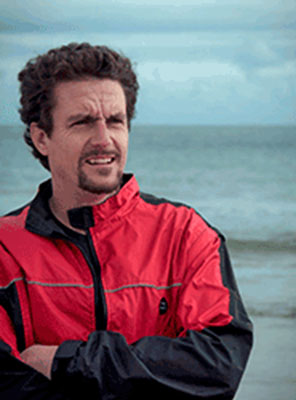
Colin Turner
[pic: Alanna
Milbourne]
To attribute this document to any single person or group would
be inaccurate and highly unfair to many people.
As with any important philosophical
or policy document, the contributors are innumerable as any one
person's ideas are modified and improved on over time.
The actual words of the Charter were written by Colin Turner,
a songwriter and music producer from Dublin, Ireland, but many
of the underlying concepts were originally inspired by,
...visionaries who, no doubt, would
attribute their inspiration to many other historical influences
too.
What's important is that, logically, this is the next step in
the progress of humanity, and one that best ensures our survival
and that of our planetary companions. With that in mind, the
Charter is, to all intents and purposes, a self-writing
document.
The near future
We are at a most interesting point in our history.
A great era of change is almost upon
us, but things may get worse before they get better as many
struggle to maintain the old system. Signing and supporting
The Free World Charter can help bring about these changes
much sooner, more peacefully and without needless suffering.
The idea of the Charter is a simple one. It is our current
system that is complicated, and the unraveling of that may take
some time, but this is a patient initiative, designed to
progress slowly and surely in one direction only - towards true
freedom, abundance and sustainability.
Please give this initiative your utmost consideration. Thank
you.
Read the Charter

The 'Small
Tortoiseshell' butterfly (Aglais urticae),
symbol of The
Free World Charter,
denoting freedom,
simplicity, maturity, and fragility.
Here below is the full text of The Free World Charter.
You will notice the Charter is not very long. In fact, just ten
basic principles make up The Free World Charter. While
the reasons and implications of the Charter are complex, the
actual principles themselves are very simple.
Each principle is terse in language to avoid ambiguity, and is
accompanied underneath by a brief description and explanation of
why it's needed.
Preamble
In this year, 2014, our personal freedoms, environment and
biodiversity have become critically endangered by our
mismanagement of global resources.
This charter document proposes ten fundamental principles on
which to grow an entirely new world society based on fairness,
common sense and survival.
Once observed, these principles will
realize human equality, minimize suffering and injustice, create
a cooperative society that promotes progress and technology, and
guarantees a healthy, diverse and sustainable world for all
species.
If you agree with this vision, please register your support by
becoming a signatory and sharing this website and its ideals
with your friends. It is only with popular support that we can
effect the kind of changes now necessary to sustain life on
Earth into the far future.
Principles
|
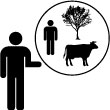 |
1 - The highest concern
of humanity is the combined common good of all
living species and biosphere.
Human beings,
animals and plants are all inseparable parts of
nature. We are IN nature - not outside or above
it. All our species are connected to each other
and the planet, and rely indirectly on each
other for survival.
Humanity's physical impact on the World is now
so great that we must exercise wisdom and
responsibility. We must now consider the needs
of all species and the environment, as well as
ourselves, in all decisions.
|
|
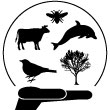 |
2 - Life is precious in
all its forms, and free to flourish in the combined
common good.
Life is an amazing
phenomenon, and, so far, our planet is the only
place we have found it. This makes it a most
rare and beautiful thing that should be
cherished and respected.
However, life is also food, and all our world's
species form a complex food-chain. In order to
maintain this food-chain - and thus our
biodiversity and survival - we must observe the
combined common good of all species when
interacting with any one.
|
|
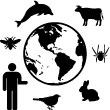 |
3 - Earth's natural
resources are the birthright of all its inhabitants,
and free to share in the combined common good.
Every living person
and creature on this planet has an automatic
entitlement to share in all the Earth's natural
resources, and to use them to live a healthy and
fulfilling life without obligation or
subordination to any other person or creature.
Humanity, due to population size and complex
lifestyle, has a particular duty not to overtax
these natural resources, or use more than is
reasonably necessary to maintain a happy and
wholesome life within the combined common good.
|
|
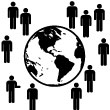 |
4 - Every human being is
an equal part of a worldwide community of humans,
and a free citizen of Earth.
Social, ideological
and border divisions between people are man-made
barriers which have no physical or natural
basis. Such artificial divisions can only be
counter-productive to the common welfare and
survival of society as a whole.
Our common similarities are, however, both
physical and natural. Generally speaking, we all
want and need the same things. With universal
cooperation and equal access, we can all apply
our skills more effectively to achieve these
common aims.
|
|
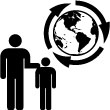 |
5 - Our community is
founded on the spirit of cooperation and an
understanding of nature, provided through basic
education.
Any child that
receives a useful and relevant education into
the workings of nature, the world and community
living, will ultimately provide the best service
to that world and that community. Traditional
career-driven education is now a measurably
destructive force.
Ultimately, education will replace regulation,
which is really only a crude system of
maintaining order. For example, a child that
fully understands why a certain action is not
possible is infinitely better equipped for life
than a child who only knows the fear of
punishment for that action.
|
|
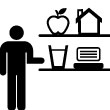 |
6 - Our community
provides for all its members the necessities of a
healthy, fulfilling and sustainable life, freely and
without obligation.
Every person should
be guaranteed the highest technically possible
standard of living without the use of money,
trade or debt. There is no longer any logical
reason not to do this. Virtually all of human
suffering is caused by our outdated system of
exchange.
All forms of debt and subordination are not only
a hindrance to progress, but are now completely
unnecessary. This is due to our command of
technology and the ease with which we can
produce and manufacture goods for ourselves.
|
|
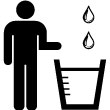 |
7 - Our community
respects the limits of nature and its resources,
ensuring minimal consumption and waste.
Our resources are
limited either by absolute quantity or by the
time it takes to manage and replace them. In
either case, we must use our resources wisely to
preserve both their supply and the environment.
In addition, we must minimize our accumulation
of rarely used goods, and the amount of
non-reusable waste that we produce. These have
direct consequences on our environment. The more
we conserve our world, the greater our chances
of survival into the future.
|
|
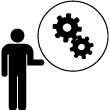 |
8 - Our community
derives its solutions and advances progress
primarily through the application of logic and best
available knowledge.
In a new society
without financial inhibitors and constraints,
the greatest challenges facing humanity will be
technical ones. ie. How do we provide enough
food, water, shelter, energy, materials, and
ensure a high standard of sustainable living for
everybody?
As opposed to traditional politics and
speculation, the scientific method is a proven,
robust system of solving these technical
problems using just the available facts and
basic logic. It also has a common reference
across all cultures and languages.
|
|
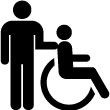 |
9 - Our community
acknowledges its duty of care and compassion for
members who are unable to contribute.
People who, for any
reason, are unable to look after themselves or
contribute back into society, should be afforded
every possible amenity, compassion and care from
the rest of the community without obligation.
Also, as future contributors to the community,
it is vital that we impart as much useful
knowledge as we can to our children, in a way
that stimulates their creativity, growth and
intellect towards future progress.
|
|
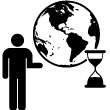 |
10 - Our community
acknowledges its responsibility to maintain a
diverse and sustainable biosphere for all future
life to enjoy.
We must remember
that we share our planet not just with other
people, animals and plants, but also with the
seeds of future people, animals and plants, who
will walk and grow here some day.
These beings, who have no voice or influence
today, are equally as entitled to life as we
are. It is in the interest of all our species to
leave the world to our future generations just
as we found it, if not better.
|
Please read it carefully and
check the box beside each
principle if you agree with it. Then enter your name, email,
country and click 'sign'.
If you have any doubts about any of
the principles, or are unclear about anything, please have a
look at our
FAQs page which may answer your
question.


